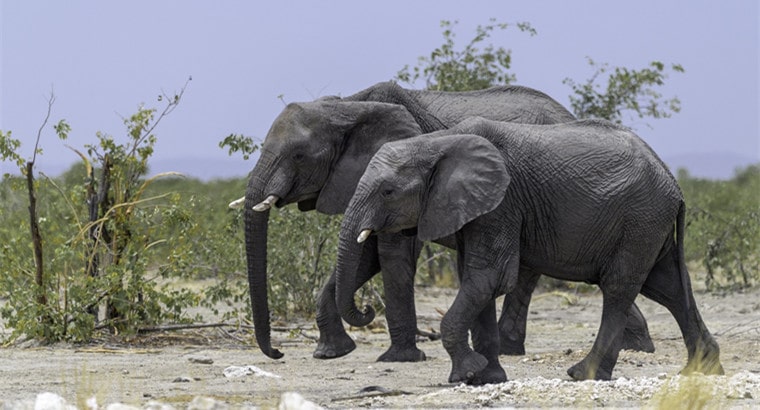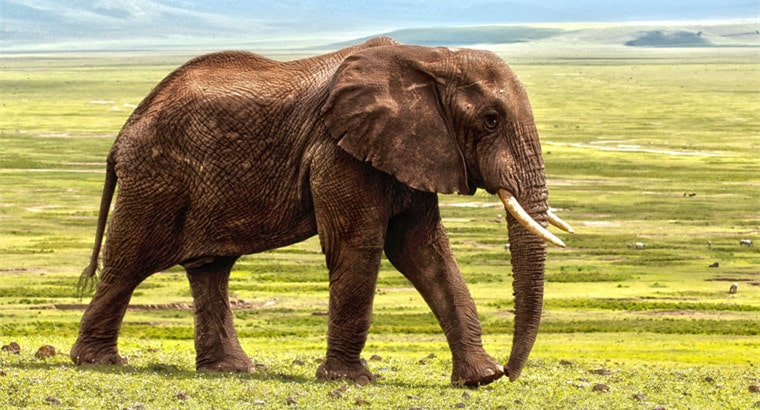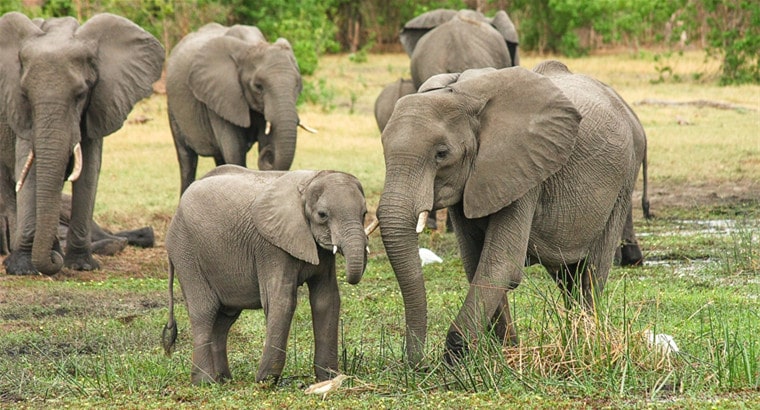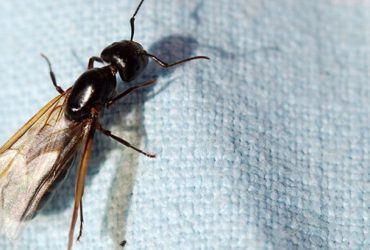The largest mammal walking the Earth today, elephants are majestic creatures that’ll put anyone in awe of them. Elephants are known to be social and are quite loving and gentle.
In fact, their lives are comparable to human lives. Their herds follow a matriarchal structure with the female elephant in charge who is also responsible for teaching the younger elephants about socializing with other animals.
However, despite their formidable stature, elephants are at significant risk of extinction, with all three known elephant species on the International Union for the Conservation of Nature’s Red List. So, how long do elephants live? Let’s take a look.
How Long Do Elephants Live?

Elephants’ highest life expectancy is similar to that of an average human — 76 years. However, this is subject to a number of factors.
Researchers have estimated the average lifespan of an elephant to be 45-49 years. Many elephants might live up to more than 75 years, subject to various factors.
While an elephant in the wild may live up to 70 years, not many elephants reach that age because of harmful human activities including poaching.
Besides, their lifespans also differ according to species. The African elephant is known to live for an average of 56 years. But the data on Asian elephants is limited. A 2008 study showed that, in Myanmar, elephants lived for 41.7 years on average in the wild.
In captivity, however, elephants live much shorter lives compared to their wild counterparts, often because of extreme stress and the risk of obesity.
In all this, human interference has had an undeniably negative impact on elephants’ lives. Let’s explore the different factors that affect elephants’ lifespans.
3 Factors That Affect the Lifespan of Elephants

#1. Captivity
Elephants are wild animals that require large areas of land to move around on. They generally migrate for hundreds of miles every year. When such animals are bred and raised in captivity, they often feel suffocated in such small and closed spaces. Being unable to freely move around causes them a great deal of stress after a while.
In zoo-bred elephants, obesity is a common health concern. Zoo breeders have also mated Asian elephants with African ones. Such cross-breeding would never happen in the wild because of obvious geographical reasons.
#2. Threats in The Wild
Although wild elephants have a greater life expectancy than zoo-bred elephants, elephants in the wild are not immune to the threat of humans. In spite of the many laws against poaching, hunting continues undeterred for various purposes.
One of the major reasons for elephants being hunted is their tusks. Poachers illegally trade elephants’ tusks in international markets for a great deal of money. Ivory tusks are used to make jewelry and other precious items and are highly sought after.
Another reason for the illegal killing of elephants is for medicinal purposes. Many traditional healers use elephant trunks, feet, penis, and hide for making medicines, especially for eczema. Elephant hide is also used in high-end furniture in many parts of Asia.
Deforestation is yet another threat to elephants living in the wild. For many years, human beings have cleared out thousands of acres of land to enable farming and building their habitats. As a part of this process, they have infiltrated the territory of elephants and destroyed their water sources.
#3. Post-Fertility Life Expectancy
Another interesting study showed that female elephants that lived post their fertile period have an exceptionally long life expectancy. This led to reproductive advantages and eventually evolved to become a positive selection.
How Can We Prolong the Lifespan of Elephants

Elephant conservation is a subject of great concern today as African bush elephants and Asian elephants considered to be endangered species and African forest elephants considered critically endangered. Here are some basic measures that can be taken to prolong the lifespan of elephants.
1. Put An End to Poaching
Poaching for the illegal trade of ivory poses the biggest threat to elephants. Unfortunately, there is no single measure that can put a stop to poaching. The process involves adopting a broad approach to target every level of the trafficking chain.
To this end, several wildlife conservation organizations are working together to save elephants. For example, the Wildlife Trade Monitoring Network, TRAFFIC, has a database called the Elephant Trade Information System (ETIS) to maintain a global record of ivory that is seized so that the illegal ivory trade routes can be identified and monitored.
Wildlife officials follow three basic steps to prevent poaching. They include:
• The effort poachers need to make is increased.
• Officials rigorously attempt to increase the risk involved for the criminals.
• Reduce the rewards poachers get from committing wildlife crimes.
Local communities are also vital in helping prevent wildlife crime. There are projects in place for better management of natural resources so that all local communities receive equitable profits. Rangers are provided with all the necessary equipment, training, and local support to prevent poachers from destroying their wildlife.
2. Stop Wildlife Trafficking
Without any stringent rules, international, organized criminal chains have started to trade wildlife products. Currently, the Wildlife Crime Initiative has been working closely with the local governments and the police to detect and seize wildlife products and convict those who are responsible.
For this, cybercrime intelligence and increased detection at checkpoints and ports are necessary. They are also working with logistics and transportation companies to track where the products and the money is going.
3. What Can You Do
The initiatives by law bodies and organizations alone can only do so much. A more permanent one will only take place with a change in the mindset of the consumer. So what can you and I do?
Support the Ban on the Ivory Trade
This one’s a no-brainer. China’s ban on the ivory trade was a major milestone in helping keep elephants safe. Do your part. Do not buy ivory or any ivory-based products, including antique ivory jewelry.
Ethical Tours
Wildlife tourism has an ugly side we may not be aware of. We’ve all seen pictures of people sitting atop an elephant on jungle safaris. But how many of us know that this demand from tourists results in cruel mistreatment and exploitation of elephants?
Any tours that offer “elephant riding” are a huge red flag that they are not ethical. Do your research about ethical tourism and make the right choice.
Support Sanctuaries
There are a number of organizations working hard with local governments and communities to protect animals. While we can’t all move to the wild to save elephants, we can certainly show our support.
You can even adopt elephants to provide organizations with the necessary funding for their conservation efforts. Some of these organizations include World Wildlife Foundation and World Animal Foundation.
A Few Parting Words
Hopefully, your question of how long do elephants live has been answered. For years, human interference has been the principal cause behind the destruction of ecosystems.
Sustainable coexistence with elephants and other wildlife is the only way to reduce ecological damage. It is crucial that scientists, conservationists, governments, and the general public work together; only then can we ensure the survival of these creatures.










